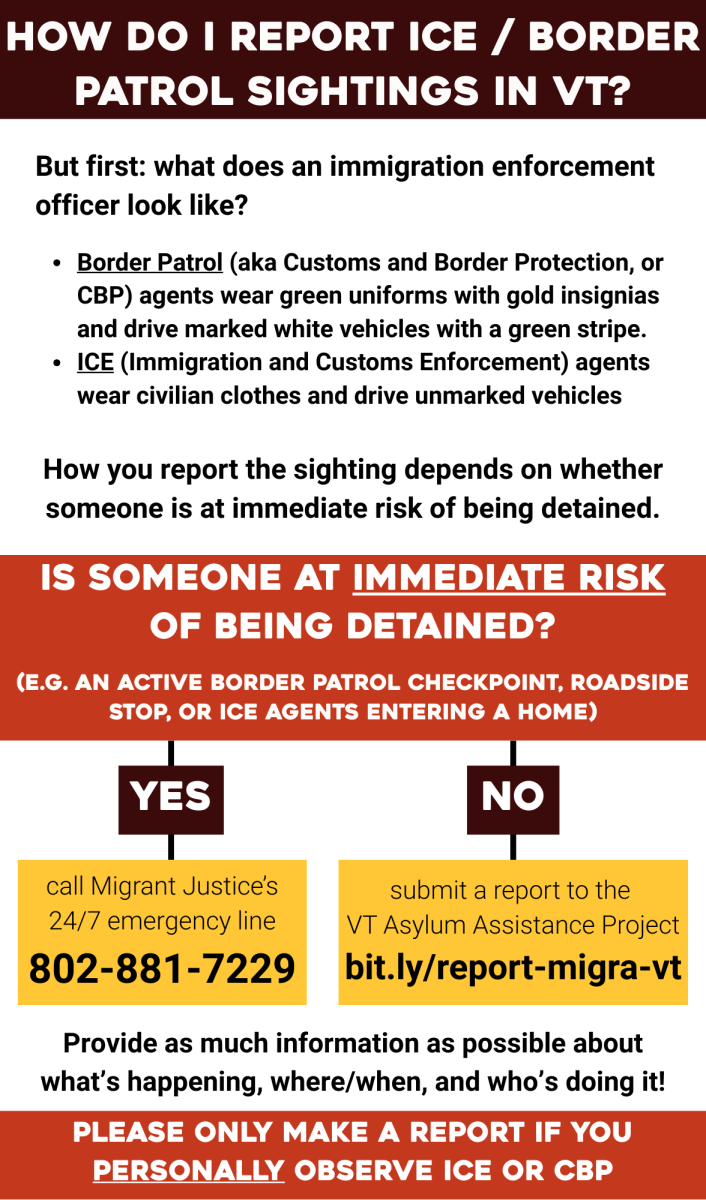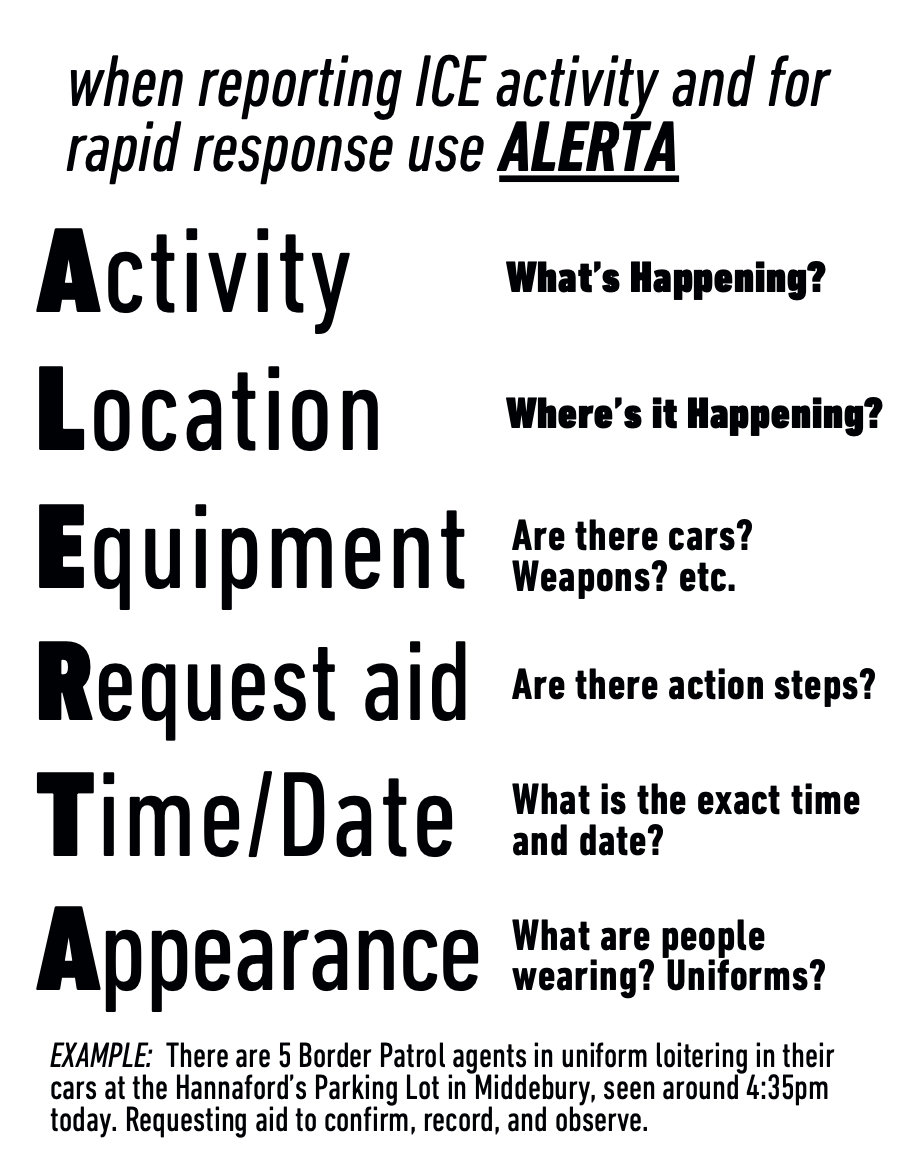Resources


(download a printable version of the above flyer information here)
Migrant Justice's Silenced Voices Documentary Film
Click below for more information:
- VT Immigrant and Farmworker Rights Resources
- For Educators
- English Language Learning and Popular Education Resources
- Farmworker and Immigrant Rights Organizations
- Family Farming, Food Justice and Farmworker Rights
- Root Causes of Migration: Globalization of Agriculture
VT Immigrant and Farmworker Rights Resources
- 2020 Transportation Guidelines for Volunteer Drivers in the Solidarity Transportation Network
- 2020 Migrant Justice Ally Orientation
- Frequently asked questions by allies about getting a Driver's Privilege Card/ID
- Access to Driver's Licenses in Vermont
- The Mexican Consulate in Boston
- Addison County Farmworker Coalition
- VT Human Rights Commission
- South Royalton Legal Clinic/VT Law School
- VT Workers' Center: resources on workers'rights
- VT Migrant Education Program
- The Open Door Clinic: free health clinic for uninsured and underinsured adults in Addison County, Vermont.
- NOTCH Health Clinics : health care for residents in the Franklin and Grand Isle counties.
- List of Vermont Health Clinics
- List of VT Newspapers for Letters to the Editor
Below are some suggestions of a variety of resources that support teachers to engage students about the inter-related topics of immigration, migrant farm workers, Vermont food systems, and globalization into classrooms.
Let us know if we can be of further help: info@migrantjustice.net
1) VT Dairy, Migrant Farmworkers, and the global food system:
- VT Migrant Farmworker Solidarity Project’s Video and Audio: Silenced Voices
- The VT Migrant Farmworker Solidarity Project is helping to support a group of workers to produce a newsletter in Spanish. The newsletter 'Nadando Contra La Corriente' (Swimming Against the Current) provides real life local stories of interest that can be used in Spanish classes.
- Return to Sender is a novel by Vermont author Julia Alvarez that tells the story of how a Mexican migrant familes' struggle to make ends meet lands them on a Vermont dairy farm also struggling to make ends meet. This is a great book for middle school classes and is available in English and Spanish (good for high school and university students).
- The Golden Cage audio interviews and photos documenting the life of migrant farmworkers and dairy farmers in VT.
- Under the Cloak of Darkness is an online documentary film that documents the life of Vermont’s migrant farmworkers and dairy farmers.
- Warning: Border Under Construction is a VT made documentary that explores the reorganization and regulation of life on the VT/Canada border and its repercussions for ordinary people. Link to trailer here.
- Milking It! Small Farmers and International Trade is an educational resource by Oxfam that compares the lives of two dairy farmers in very different countries. How are they affected by international trade rules? Who makes these rules, and what can we do to change them? Here is a quiz on 'how much do you know about milk, small farmers, and international trade.'
- Global Food Challenge: A cross-curricular resource to teach 11-14 year olds about global food issues.
While Vermont has roughly 1200-1500 migrant dairy workers, Wisconsin has over 5,000 migrant dairy farm workers. Though the contexts are different there are also many similarities. These links provide more information about Wisconsin's migrant dairy workers:
- Immigrants now 40 percent of state's dairy workforce
- Wisconsin's dairy industry would collapse without the work of Latino immigrants - many of them undocumented
- This award-winning audio documentary series from David Somerstein from North Country Public Radio documents a trip a group of Northern New York Dairy Farmers made to Mexico to better understand where their employees were migrating from.
- The Dark Side of Dairies: Every day, agricultural workers risk their lives to produce America's milk
- This 2020 Dairy Market Report conducted by Dairy Management Inc. is a great detailed look at the corporate control of dairy industry and its impacts on farmers.
- A 2016 article in the New Labor Forum on the Dairy Industry's national switch to immigrant workers, its effects, and how workers are organizing for their rights: Milking Workers
2) The history of VT Agriculture:
- Filmed in Orange County, Vermont, featuring Kenneth and Helen O’Donnell and their draft horses, Last Stand Farmer is a documentary record, filmed through four seasons, of the life and philosophy of an elderly hill farmer and his struggle to keep his 19th century farm operation going. Soon after he viewed the finished film, Kenneth O’Donnell died; his widow sold the farm and moved away the following spring.
- Without a Farmhouse Near by Deborah Rawson is a great book to help understand the struggles of maintaining family dairy farms in Vermont. Although the book was published in the 1989 it foreshadows why so many Vermont dairy farmers came to rely on migrant labor just 10 years after the book was written.
- El viaje más caro/The Most Costly Journey is an ethnographic cartooning project that pairs Vermont cartoonists with Latin American migrant farm workers on Vermont dairy farms.
- Hands on the Land: A History of the Vermont Landscape examines the history—natural, environmental, social, and ultimately human—of one of America's most cherished landscapes: Vermont. It explores the history of dairy farming, which provides helpful context to explore the forces that led Vermont farmers to come to rely on migrant labor:
- Changes in the Land: Indians, Colonists and the Ecology of New England by William Cronon traces how broader political and economic changes since the arrival of the colonists have massively transformed the human-environment relationship in New England and produced entirely new landscapes that reflect these broader changes. The book provides an excellent historical back drop to explore the recent inter-relationships between migrant farm workers from Mexico and struggling Vermont dairy farms in Vermont.
- VT Feed and the Farm to School Network have some great ready to go lessons for teachers on Vermont agriculture, farming, and food systems.
3) Globalization and Migration: Teaching for Equity and Justice:
Rethinking Schools has a variety of excellent resources to help educators organize units around migration and globalization such as:
- Border/Immigration Issues
- The Line Between Us
- BRIDGE: Building a Race and Immigration Dialogue in the Global Economy. A Popular Education Resource for Immigrant and Refugee Community Organizers
- UPROOTED: Refugees of the Global Economy is a compelling documentary about how the global economy has forced people to leave their home countries.
- The Roots of Migration is an on-line documentary film that explores the important question: why do so many people migrate to the United States from Mexico and what are the impacts on communities in Mexico? (Part 1, Part 2)
4) Farmworker and Immigrant Justice:
- The Student Farm Worker Alliance has an impressive list of articles and books to choose from.
- These short online PBS NOW Videos document the Coalition of Immokalee Workers from Florida who have waged impressive and successful struggles against modern day slavery in US agriculture and their multi-faceted campaigns have successfully challenged food giants Taco Bell, McDonald’s and Burger King.
- Your America Video
- The Battle Fields
- Here is a link to dozens of video and audio clips from the United Farmworkers.
5) Immigration Policy and Enforcement:
- Up-to-date information about Immigration Policy and Enforcement.
- An interview available in video or audio from Democracy Now about the militarization of the U.S.-Mexico border. We suggest searching on democracy now for additional resources/interviews to keep current.
- Injustice for All: The Rise of the Immigration Control Regime is the executive summary of National Network for Immigrant and Refugee Right's 2009-2010 HURRICANE human rights report documenting U.S. human rights violations committed against immigrant families, workers and communities.
- Excluded and Exploited: The New Regime of Trade, Managed Migration and Repression is a new in depth report about the relationships between economic globalization and migration. Democracy Now: Jailed Without Justice
6) Good readings, literature and creative writing on immigration, farm workers, borders and border crossings:
- Luis Alberto Urrea's books including Across the Wire and the Devil's Highway are highly recommended reading for teachers looking to creatively engage the border and immigration issues.
- Ruben Martinez's Crossing Over: A Mexican Family on the Migrant Trail is a must read for those looking at the complexities of migration, identity, and transnational communities.
- Author Wendy Call has some great suggestions for further reading here.
English Language Learning Resources and Popular Education
- Nina Wallerstein and Elsa Auerbach have published several books and resources, working together and separately, that are great tools for ESL teachers trying interested in popular education.
- Wallerstein and Auerbach inspired working draft of a booklet adapted and designed with VT context in mind for ESL teachers working on dairy farms with migrant farm workers wanting to utilize Problem-Posing ESL Popular Education techniques.
- Though this isn't specifically designed for ELL educators, this text has some great and easy to adapt popular education activities and does a great job introducing popular education in an accessible way.
Farmworker and Immigrant Rights
This is a list of some national and local organizations working every day for the human rights, dignity, and justice for farmworkers and immigrants.
- Coalition of Immokalee Workers
- Food Chain Workers Alliance
- National Network for Immigrant and Refugee Rights
- National Day Laborer Organizing Network
- Southwest Workers' Union
- Border Agricultural Workers Project/Sin Fronteras Organizing Project
- Border Network for Human Rights// Red Fronteriza de Derechos Humanos
- No More Deaths
- BorderLinks
- Humane Borders // Fronteras compasivas
- Coalicion de Derechos Humanos
- Frontera de Cristo and Cafe Justo
- New Sanctuary Coalition of New York City
- Florida Immigration Coalition
- Somos Un Pueblo Unido
- Student/Farmworker Alliance
- United Farm Workers
- Farm Worker Labor Organizing Committee
- National Farm Worker Ministry
- US Human Rights Network
- Grassroots Global Justice
- Via Campesina
- Detention Watch Network
- National Immigration Project
- National Immigration Law Center
- National Immigrant Justice Center
- Migrant Defense Project
- Rights Working Group
- DC Jobs With Justice
- Student Action with Farmworkers
Family Farming, Food Justice and Farmworker Rights
These organizations see the need to bring together family farming, food justice, and farmworker rights organizations to rebuild our food systems!
Root Causes of Migration: Globalization of agriculture
Many immigrants in Vermont and throughout the US are displaced family farmers from other countries who have suffered greatly from the advancement of the globalization of corporate agriculture, which promotes unequal competition between huge subsidized corporate agribusiness with small farmers. Since the 1994 passage of North American Free Trade Agreement (NAFTA) Mexico lost over 2 million farming jobs and the number of Mexicans migrating to the U.S. each year has more than doubled. Subsidies, price supports, and various programs supporting small farmers were eliminated due to NAFTA.
